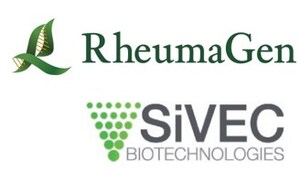
AURORA, Colo., Oct. 28, 2025 /PRNewswire/ -- RheumaGen, Inc., a cell and gene therapy company engineering a new class of therapeutics to cure common autoimmune diseases, today announced groundbreaking preclinical research that supports a nearly universal target for almost all of the company's human leukocyte antigen (HLA) gene-editing therapies. While previous approaches required creating individual gene edits for specific demographics of patients, this new "anchor-position editing" enables a nearly universal target to modulate the human immune system. Importantly, RheumaGen's preclinical data shows that editing only one amino acid at position 82 of an HLA molecule, or anchor-position editing, substantially blocks three of the most critical self-peptides in rheumatoid arthritis (RA) from being presented to T cells. This data was featured in an oral presentation by Vibha Jha, Ph.D., from the Center for Clinical Immunology at the University of Colorado Anschutz Medical Campus, at the American College of Rheumatology (ACR) Convergence 2025, taking place on October 25-29, 2025, in Chicago.
"The discovery of anchor-position editing and the related preclinical data will be a game-changer, not only for RheumaGen, but also ultimately for our cell and gene therapy (CGT) industry," said Richard Freed, CEO & Co-Founder of RheumaGen. "By identifying a nearly universal HLA amino-acid target, we can selectively and substantially quiet harmful alleles for autoimmune patient populations across demographics and even across both common and rare diseases alike."
This new discovery focuses on a universal human target and how to selectively modulate the invariant HLA region. By targeting the invariant region, RheumaGen's team has uncovered a new HLA gene-editing approach that they believe can be done even more safely and to greater effect than before while substantially reducing peptide binding across all key self-peptides and preventing additional peptide binding from being created.
"We call it anchor-position editing because position 82 is an important HLA anchor position that binds to a peptide's backbone for presentation to T cells," said Dr. Brian Freed, Chief Science Officer & Co-Founder of RheumaGen. "Nearly every person has the same amino acid, asparagine, at position 82 of their HLA molecule. When a non-polar amino acid, like leucine, is substituted at that position, it breaks the hydrogen bond and effectively acts like a zipper – failing to connect at the bottom, it cannot zip up."
This incredibly precise, one-amino-acid edit of the HLA locus substantially reduces self-peptide binding and in turn T-cell presentation for the selected allele. Data presented by Dr. Jha at ACR show that anchor-position editing successfully blocks three of the most critical self-peptides in RA – both citrullinated peptides and collagen – from being presented to T cells. In addition, rather than mirroring a resistant allele, anchor-position editing simply reduces peptide binding much more broadly, potentially treating more indications without creating de novo peptide binding.
In terms of safety, HLA is the most polymorphic gene system in humans, with extensive overlapping protection. Every person has anywhere from 10-14 alleles. RheumaGen only targets the source of autoimmune disease and selectively quiets one of the 10 or 14 alleles fueling immunity. This approach contrasts sharply with the current standard of care, such as biologics or other drugs, that globally suppress a patient's immune system.
"It has been previously shown that allogeneic transplants can cure autoimmunity," added Dr. Freed. "The problem was that these procedures were not safe enough for patients because of immunogenicity and the risk of rejection. RheumaGen's potential innovation is that we have introduced the minimal amount of alloreactivity to still significantly mediate – or in fact, cease – the disease."
While Dr. Jha's presentation focuses on RheumaGen's lead asset, RG0401, to treat refractory RA, RheumaGen is advancing a pipeline of treatment candidates to cure common autoimmune diseases in which HLA alleles play a critical epidemiological role, including development programs for multiple sclerosis, type 1 diabetes, celiac disease, and ankylosing spondylitis.
"HLA anchor-position editing unlocks a nearly universal target across almost all our indications," added Richard Freed. "The commercial, regulatory, and accessibility implications of this target are significant. RheumaGen is part of the next wave of CGT companies systematically solving for the industry's challenges, and our differentiated HLA gene-editing approach has the potential to create durable, one-time therapies for chronic autoimmune diseases that could help millions of patients and their families."
Oral Presentation Details:
Title: Gene Editing of HLA-Class II DRB1*04:01 at Position 82 Abrogates Binding of Citrullinated Arthritogenic Peptides and Collagen
Session: Genetics, Genomics & Proteomics
Date and Time: Monday, October 27, 2025, 3:45-4:00 p.m. CT
Abstract Number: 1701
Presenter: Vibha Ja, Ph.D., University of Colorado Anschutz Medical Campus
About RheumaGen, Inc.
RheumaGen is a private biotechnology company engineering a new class of therapeutics to cure common autoimmune diseases. RheumaGen focuses on editing the human leukocyte antigen (HLA), or "immune gene," to develop one-time, curative cell and gene therapies. RheumaGen is headquartered in Aurora, Colorado, and partners with the ClinImmune Center for Clinical Immunology at the University of Colorado Anschutz Medical Campus for clinical development and manufacturing. For more information, please visit rheumagen.com or follow the Company on LinkedIn.
About ClinImmune
Founded in 1997 by Dr. Brian Freed, the ClinImmune Center for Clinical Immunology has become a cornerstone of transplant and cell-therapy excellence. Located on the University of Colorado Anschutz Medical Campus, the Center operates a state-of-the-art, 25,000-square-foot cGMP facility staffed by ~80 highly trained professionals. Since its inception, ClinImmune has facilitated more than 10,000 organ and stem-cell transplants and currently supports dozens of clinical trials advancing cell-based therapies. With a steadfast commitment to scientific rigor and patient care, ClinImmune continues to drive innovation in immunology and regenerative medicine. For more information, please visit clinimmune.com.
SOURCE RheumaGen, Inc.








Share this article